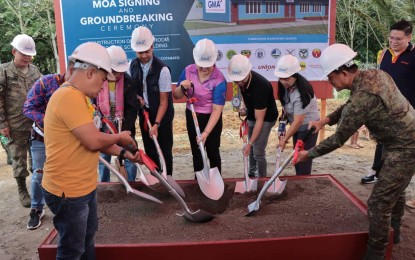
CALAMITY-PROOF CLASSROOMS. Officials from the GMA Kapuso Foundation Inc., the Department of Education, the local government of Kidapawan City, and the Army's 10th Infantry Division lead the groundbreaking Thursday (July 20, 2023) of one of two-classroom buildings that will be built in the villages of Perez and Ilomavis, Kidapawan City, North Cotabato. The two-classroom buildings are designed to withstand 280 kilometers per hour windspeed and an 8.0 magnitude earthquake. (Photo courtesy of 10ID)
DAVAO CITY – Some 450 indigenous people (IP) students in two indigenous communities in Kidapawan City, North Cotabato, victims of a 2019 earthquake, stand to benefit from separate two-classroom buildings initiated by four donors.
In a statement Friday, the Army’s 10th Infantry Division (ID), said the buildings, which broke ground on Thursday, were the result of a memorandum of agreement among the GMA Kapuso Foundation Inc. (GMAKFI), Department of Education, and the Kidapawan local government.
The school building projects will be constructed in the IP communities of Barangays Perez and Ilomavis in Kidapawan City.
Maj. Gen. Jose Eriel Niembra, 10ID commander, committed to supervise and sustain the construction phase.
The classrooms are designed to withstand 280 kilometers per hour windspeed and 8.0 magnitude earthquake as part of the continuous support of the government to Kidapawan quake-affected residents.
In October 2019, a quake registering 6.0 in magnitude on the Richter scale, struck North Cotabato that affected 11,000 families.
"It’s one way of helping our people escape the clutches of poverty, no other than education. First, we’ll build schools where our children can go and study to help achieve their dreams," Niembra said.
He also assured that the school buildings are situated away from the fault lines and are located at the ancestral domain of the Obo-Manobo tribe which the IP leaders donated.
Meanwhile, Rikki Escudero-Catibog, GMAKFI executive president and chief operating officer, said he expects to complete the project within three to four months.
"Initially, we planned to build a village for the quake-affected residents. We had raised funds but the pandemic entered and all our plans were compromised,” he said.
However, now that the coronavirus disease 2019 pandemic has dissipated, he said they shifted to building schools “based on available resources and needs of the community.” (PNA)
